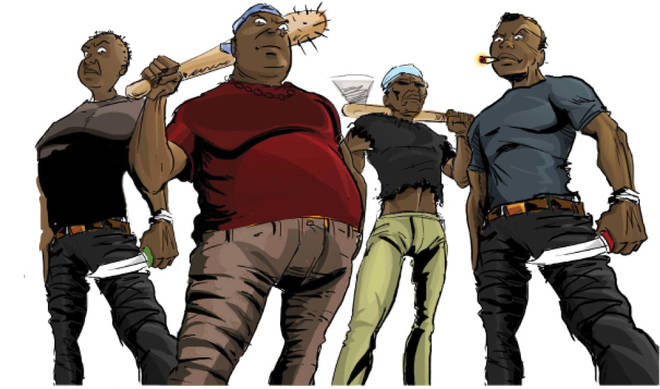Tackle political thuggery now
Less than a year to the crucial and anxiety-ridden 2023 elections, Nigeria’s political landscape is being soaked with blood and tears, as political violence has begun to sprout out with its dreaded heads from North to South and East to West. The rate at which innocent Nigerians are being killed in the name of politics […]

FILE PHOTO: Thuggery
Less than a year to the crucial and anxiety-ridden 2023 elections, Nigeria’s political landscape is being soaked with blood and tears, as political violence has begun to sprout out with its dreaded heads from North to South and East to West. The rate at which innocent Nigerians are being killed in the name of politics is worrisome and should be of serious concern to political parties, security agencies, and the government itself. Nine persons have so far been killed this year; two in Osun, one in Kano, five in Enugu and one in the FCT. On Wednesday, April 13, 2022, hoodlums numbering over 30, disrupted proceedings in the hearing of a suit on the disputed ward, local government and state congresses of the All Progressives Congress (APC) at the Bayelsa State high court, Yenagoa. In the fracas, court officials, lawyers and claimants in the suit were injured. Even the presiding judge, Justice Nayai Aganaba, was pelted with plastic bottles before his police orderly rescued him.
Even in the relatively unassuming and peaceful FCT, the council elections in February this year was not without the shedding of blood. In the polls, thugs attacked and burnt down the house of a Peoples Democratic Party (PDP) chieftain, Alhaji Mohammed Ibrahim Sheda, and another set of mobs stabbed Ilyasu Sani, a member of the APC in Sheda Community of Kwali Area Council to death. Also, in the local government elections conducted in Enugu this February, five persons were reportedly killed in gunmen attacks on two polling units in Nkanu West Council. In the South West, on April 10, 2022, Chief Gbenga Ogbara, the chairman of the APC in Atakumosa East Local Government Area was murdered in his sitting room by ‘suspected gunmen’ at about 12.00am. Chief Ogbara’s murder was suspected to be politically motivated because of his role in the forthcoming governorship election in Osun State.
The above are few examples of the recurring violence that underscores council and state elections, and at this rate, it is easy to guess the integrity of the 2023 general elections. It is well-known in Nigeria that electoral violence is a forerunner of rigging, intimidation, manipulation of electoral process, and the killing of opponents before, during and even after elections. As reported by election monitoring bodies, since 2007, Nigeria’s elections have not been devoid of violence. For instance, in 2007, about 300 persons lost their lives during the elections; in 2011, there were about 800 deaths, with over 48,000 persons displaced in 12 states; in 2015 about 100 persons lost their lives, mainly before and during the elections, while in 2019, over 600 lives were lost during the elections.
Political violence has persisted in Nigeria because of the weak and unserious justice system which shies away from prosecuting the political elite who are usually found culpable. For instance, former Inspector General of Police Muhammad Adamu told Nigerians in July 2019 that as many as 58 persons were arrested for alleged high profile electoral violence. However, it is not clear if any of them was prosecuted to a logical conclusion and jailed. Because powerful political leaders who allegedly sponsor and benefit from political violence are not convicted and punished, other politicians follow their evil footsteps, killing, maiming and destroying lives, as part of their political and electioneering strategies.
Partly responsible for the miscarriage of justice in dealing with political violence is the fact that there is, at present, no law dedicated to tackling the crime. Unfortunately, President Muhammadu Buhari is slow in signing into law the Electoral Offences Commission Bill passed by the Senate in July 2021. The bill is meant to take away the burden of prosecuting offenders from the Independent National Electoral Commission (INEC), as the electoral umpire cannot effectively add that responsibility to its cardinal assignment of conducting free and fair elections. Evidence of this unnecessary burden on INEC is expressed in the fact that it failed to prosecute one per cent of the 870,000 electoral offences committed in the country in the 2011 elections. Also, in the 2015 elections, INEC reported that over 900,000 electoral offences were committed, among them violent killings, but it has no resources to comprehensively prosecute the offenders. Without the president signing the bill into law, we fear that in 2023, it shall be business as usual, and the past incidents of electoral violence would be repeated, perhaps, in a more appalling dimension, as previous impunities were never met with stiff penalties.
We call on all stakeholders in the forthcoming elections – political parties, INEC, security agencies and federal government – to immediately begin to devise strategies to avert unnecessary violence in the 2023 elections. Elections are a battle of ideas, not a bloody war. Every Nigerian life is as precious as another, be it that of a governor, legislator or even that of the president. We must avert unnecessary bloodshed by dealing with political thuggery now.
